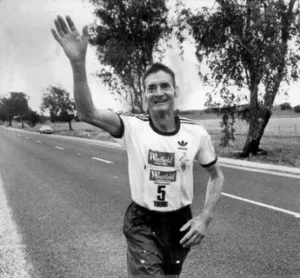I know you must have heard the phrase Battle of the Sexes before now in banter, in boardrooms, in light-hearted competitions between boys and girls, and maybe even in pop culture. But today, I’m not here to talk about the phrase as we throw it around casually. I’m here to tell you the story of the historic, real-life event that brought this phrase to life, or at least, the one that made it thunder across headlines, households, and history books.
It was more than just a tennis match. It was a battle between ego versus equity. Arrogance versus advocacy. One man’s ego, inflated by years of sexist jabs and outdated bravado, clashed with one woman’s determination to prove that respect is not gendered: it is earned. This is the story of Bobby Riggs and Billie Jean King and the match that stopped a nation.
Who Was Bobby Riggs?
To understand the magnitude of this story, you need to understand the man who stood on one side of the court that day. Bobby Riggs wasn’t just any man. He was once the No. 1 ranked tennis player in the world, a Wimbledon champion, and a former national hero. By the time of this event, 1973, he was 55, semi-retired, and far more famous for his sexist quips than his backhand.
Riggs had become a caricature of 1950s machismo. Loud, smug, and self-proclaimed as the “male chauvinist pig”, he wore the title like a crown. And he didn’t stop there. He routinely belittled women’s tennis, insisting that even in his 50s, he could beat any female player alive. He saw women’s participation in professional sports as little more than a novelty act.
He didn’t just talk the talk. In 1973, he challenged Margaret Court, then the top-ranked female tennis player in the world, to a match. It was christened the Mother’s Day Massacre, and it lived up to the name in the worst way.
The Mother’s Day Massacre: A Disheartening Blow
Margaret Court was no pushover. She was strong, skilled, and at the top of her game. But on that particular day, something went wrong. Bobby Riggs, despite his age and fading prime, crushed her in straight sets. It was a humiliating defeat that rippled far beyond the court.
It wasn’t just a loss for Margaret. It was a blow to every woman who had been clawing her way into male-dominated arenas, trying to prove that talent and skill aren’t gender-specific. And what made it worse wasn’t the loss itself; it was the victor—Riggs.
Riggs soaked in the attention like a sponge dipped in gasoline. He used the win as ammunition to further ignite his sexist rants. He boasted that he’d go on a global tour, defeating the best women in tennis country by country. To him, this wasn’t just about tennis. It was about proving, as he once said, that “women belong in the bedroom and kitchen”. His words were not just offensive. They were infuriating, and they struck a nerve.
Billie Jean King: The Fire That Met His Fury
Billie Jean King wasn’t just any athlete. She was a force of nature — fierce, focused, and fully committed to fighting for gender equality. She was the new world No. 1 in women’s tennis and a proud, vocal advocate for women’s rights in sports.
Where Bobby Riggs represented outdated chauvinism, Billie Jean King stood for everything modern, progressive, and bold. She wasn’t just fighting for herself. She was fighting for every young girl who dared to pick up a racket, every woman demanding equal pay, and every soul who believed in fairness.
So when Riggs set his sights on her, she didn’t hesitate.
She accepted the challenge. The match was set: $100,000, winner-takes-all. No rematch. No excuses. It was dubbed the Battle of the Sexes — and this time, the stakes were much bigger than a trophy or a pay cheque. This was a cultural showdown.
A Spectacle Unlike Any Other
On September 20, 1973, more than 30,000 people packed the Houston Astrodome — the largest crowd to ever witness a tennis match in the U.S. at that time. Over 90 million viewers tuned in from their living rooms, glued to their screens. It was a moment soaked in anticipation and drama.
Billie Jean made her entrance in full Cleopatra flair — carried into the arena on a golden litter by four shirtless men dressed as Roman slaves. It was cheeky, fierce, and theatrical. But it was also symbolic: she was royalty in her domain, and she knew it.
Then came Bobby, true to form. He entered in a rickshaw pulled by women he called “Bobby’s Buxom Beauties.” It was absurd, but most of all, it was on-brand for a man whose persona thrived on outdated gags and self-importance.
Theatrics aside, the match was about to begin, and Billie Jean came prepared.
A Game Plan Designed to Shatter Ego
Billie Jean King had studied Bobby’s game with almost surgical precision. She knew that despite his age, he was still cunning and skilled. He wasn’t going to be easy. But she also knew something else: he wasn’t in shape. Not for a long, grinding match.
So she did what champions do. She adapted.
Rather than relying on her usual aggressive style, Billie Jean chose strategy. She played long rallies. She moved Bobby around the court with lobs and drop shots, forcing him to run, to chase, to sweat. She didn’t need to overpower him; she needed to outlast him. And it worked.
Bobby took an early lead, but the momentum quickly shifted. Billie Jean took the first set 6-4. Then the second, 6-3. By the third, Bobby was gassed, his legs heavy, his breathing laboured. Billie Jean didn’t let up.
Finally, with one final point, she secured the third set 6-3. It was over. Billie Jean King had won in straight sets. The crowd erupted. The world had watched a woman stand toe-to-toe with a man who represented everything women had been fighting against and beat him.
More Than Just a Match: A Global Turning Point
The Battle of the Sexes wasn’t just a tennis match. It was a defining cultural moment. It brought the conversation about gender equality to the forefront of global consciousness. Billie Jean King didn’t just win for herself. She won for every woman whose competence had ever been doubted. Every girl who had been told, “You can’t.” Every athlete, professional, student, or leader who had to fight twice as hard for half the recognition.
From the moment her racket struck that final ball, Billie Jean King became more than an athlete. She became a symbol of resistance and possibility.
A courageous advocate for gender equality from a young age, she took a massive risk stepping onto that court. But in doing so, she launched her fight into the worldwide limelight. She forced the world to look and to rethink.

The Battle Isn’t Over
It would be comforting to end this story with Billie Jean’s victory as the moment the battle of the sexes was resolved. But reality is rarely that neat.
Even today, decades later, we are still living in the long echo of that match. The battle of the sexes continues, not just in sports, but in families, classrooms, boardrooms, politics, and even religion. Women still earn less. Their leadership is still questioned. Their competence is still debated. And in more subtle, insidious ways, they’re still told to shrink, to smile, and to stay in line.
Just recently in Nigeria, a senator accused the Senate President of deliberately sidelining her and other women in legislative appointments. Whether these particular allegations prove true or not, they reflect a pattern that resonates far beyond Nigeria. Across the world, women have shared similar experiences—of being excluded, overlooked, or subtly undermined—most of which never make the headlines.
These stories don’t always come with media coverage or hashtags, but they’re real. They live in whispers, in the quiet shrinking of ambition, in the resignation that comes after fighting too many unseen battles. The echoes of Bobby Riggs’ loud chauvinism may not sound the same today, but the tone; dismissive, patronising, and calculated, is all too familiar. This isn’t just history repeating itself. It’s history refusing to let go.
Sometimes it’s lighthearted: boys vs. girls in a game, a debate, or a workplace challenge, but beneath the surface, the tension is real. The scale is rarely balanced.
And that’s why stories like Billie Jean King’s matter so much. Because they remind us that the fight for equality isn’t over. They remind us what courage looks like. And they remind us that no matter how loud the noise of sexism may be, the sound of one woman standing her ground can be even louder.
The Battle of the Sexes is more than history. It’s a mirror. It shows us how far we’ve come and how far we still need to go. Billie Jean King didn’t just play tennis that day. She played for every woman who had something to prove. And she won.
So the next time you hear someone throw around that phrase casually, remember where it came from. Remember the day a woman walked into a stadium full of doubt, faced off against a legend, and left the court as a legend herself.
And more than anything — remember that the battle still rages on.
Trivia: Billie Jean King is very much alive today. At 81, she remains deeply involved in championing gender equality, recently earning a star on the Hollywood Walk of Fame and advocating for women’s rights in sports through the Billie Jean King Cup and beyond.
There is a movie adaptation of this historic event. Treat yourself.
Stay frosty.




